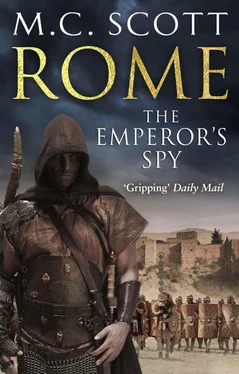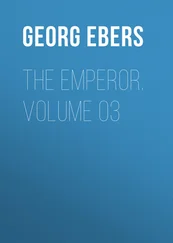M. Scott - Rome - The Emperor's spy
Здесь есть возможность читать онлайн «M. Scott - Rome - The Emperor's spy» весь текст электронной книги совершенно бесплатно (целиком полную версию без сокращений). В некоторых случаях можно слушать аудио, скачать через торрент в формате fb2 и присутствует краткое содержание. Жанр: Исторические приключения, на английском языке. Описание произведения, (предисловие) а так же отзывы посетителей доступны на портале библиотеки ЛибКат.
- Название:Rome: The Emperor's spy
- Автор:
- Жанр:
- Год:неизвестен
- ISBN:нет данных
- Рейтинг книги:3 / 5. Голосов: 1
-
Избранное:Добавить в избранное
- Отзывы:
-
Ваша оценка:
- 60
- 1
- 2
- 3
- 4
- 5
Rome: The Emperor's spy: краткое содержание, описание и аннотация
Предлагаем к чтению аннотацию, описание, краткое содержание или предисловие (зависит от того, что написал сам автор книги «Rome: The Emperor's spy»). Если вы не нашли необходимую информацию о книге — напишите в комментариях, мы постараемся отыскать её.
Rome: The Emperor's spy — читать онлайн бесплатно полную книгу (весь текст) целиком
Ниже представлен текст книги, разбитый по страницам. Система сохранения места последней прочитанной страницы, позволяет с удобством читать онлайн бесплатно книгу «Rome: The Emperor's spy», без необходимости каждый раз заново искать на чём Вы остановились. Поставьте закладку, и сможете в любой момент перейти на страницу, на которой закончили чтение.
Интервал:
Закладка:
He started with his own body, documenting the pain, beginning with his ankles, working up through his spine and chest to his arms and last to his face. After the sea ride, his shoulders were on fire where the muscles had torn and never fully healed, and a nagging ache in his left ankle where the legionaries had seared the tendon had become sharper.
None of it was new or unexpected, only to be noted for how it might affect his movement in the day.
Rolling over on his side, he turned his attention to his immediate surroundings, to the straw in the mattress beneath him, to the rat urine recently voided near the foot of the bed, upward to the first grey light of dawn outlining the shutters, to the door a few feet away, which remained closed and had not been opened in the night; and finally, when he was sure he was alone in a room that had not been disturbed while he slept, Pantera directed his attention out to the coughs and curses of the waking guests in the tavern rooms on either side and below.
Listening with half an ear to bets offered and laid, and lengthy morning commentaries on the health of the horses and their drivers, Pantera rose at last, dragged his hand through his hair and crossed the room stiffly to the window, where he pushed himself through morning exercises that would have shamed Leonides and his Spartan martyrs at Thermopylae.
Feeling looser in spine and limb, he dashed water on his face from the ewer in the corner, rearranged his hair again, and lifted from his travelling chest the fine linen tunic that had been the legate’s gift on leaving, and the leather belt with the silver buckle fashioned to show the running deer of the Dumnonii that had been Aerthen’s and had by some miracle survived the inferno of the battle’s end.
His sandals had been made to his own design by the cobbler in Lugdunum. Their chief asset was that he could shed them easily and go barefoot if he needed to be silent.
His four knives lay on top of his second tunic in separate sheaths of walnut-dyed doe hide. Two together were ready to be strapped to the inside of one forearm, one other for his leg, and the last for his waist if he wanted it for show.
They were plain, but finely balanced, with only the single mark of Mithras branded into the pale beechwood hilts — and entirely inappropriate for his morning’s task. With regret, he placed them back in the chest, closed the lid and padlocked it.
On leaving, he took a pinch of fine, white flour from a pouch at his belt and blew a drift of it across the floor just inside the door. Thus protected, or at least forewarned, Sebastos Abdes Pantera readied himself for his meeting with his emperor.
In the lushly tended garden, in the heart of the magistrate’s residence, a eunuch of moderate provincial talent sang the Lament of Daedalus to greet the dawn.
Pantera stood under a sun-pinked marble archway and listened to the first notes waver up to a scratchy peak as four Germanic gate-guards searched him for weapons. They found none because he had left them locked in his chest for precisely this reason. When he said as much, stretching the limits of his German, they laughed at him and spoke fast amongst themselves in a dialect he could not follow.
They were Ubians, big, red-haired, over-armed barbarians from one of the tribes that lived along the swamp-banks of the Rhine, a hangover from Caligula’s time, when they had fought one another in single combat for the privilege of providing the emperor’s bodyguard. In Nero’s retinue, they outranked the praetorians, and were known from one side of the empire to the other for the blind ferocity of their loyalty. Astoundingly, given their reputation, these four were sober.
Ahead of him, on the far side of the atrium, the singer dragged Icarus to new heights.
The guards were immune to the song’s missed notes. Forming a small column fore and aft, they marched Pantera in through the gates and down a wide, echoing marble vestibule where the floor was a chequerboard of black on white mosaics and the walls were alive with a gilded, many-coloured frieze of Apollo Kitharoedus that showed the god holding forth with his lyre to four listening nymphs of striking, if androgynous, beauty. The high roof was laid with gold leaf, angled so that it caught the sun’s first rays and cast them ahead into the garden, blindingly. For the first time in many years, Pantera knew himself to be in the presence of truly effortless wealth.
The guards clashed to a halt. Pantera was ushered across the atrium to the edge of the greenly forested space that was the magistrate’s colonnaded garden.
The magistrate’s guests were at breakfast, or perhaps had not slept at all and were simply on the latest course of a many-layered dinner with suitable entertainment. Somewhere in all that foliage, screened behind the mulberry trees and cultivated citrus, the twining ivies and honeysuckles, the lament paused on a long, aching note. Small songbirds fluttered brightly in cages hanging from the pillars. A tame jay swooped down from left to right, and rose again, carrying a grape. Grey carp kissed the surface of an oval pool, reaching up to the endlessly still fingers of a naked stone Narcissus who leaned over the water, absorbed in his own reflection. The largest carp, when it rose, had a gold ring embedded in its dorsal fin.
In a garden of such beauty, the inhabitants could not be less so. An unclothed Nubian girl-slave passed by, who could have modelled for one of the nymphs on Apollo’s wall frieze. Two more girls and a boy followed, all naked, long-limbed as herons, graceful as swallows. Their bare feet made no sound on the marble floor.
The members of the emperor’s retinue were at least partially dressed; it was the easiest way to tell them apart from the slaves. For the most part, they were equally beautiful. The magistrate was one of the exceptions. Older than the others, his hair was silver and his features bore the stresses of political life. Even so, he had an air of grace that bound him to the group as a man of like kind.
One man there was not beautiful, neither did he drift between the columns talking to the other guests, but stood in the citrus grove to the magistrate’s right, staring at Pantera with undisguised loathing.
He was tall and bitter-faced, with a high brow and straight black hair pressed back by a receding hairline. He bore no obvious weapon, but a disturbance to the outline of the sleeve on his right arm spoke of a knife strapped there.
Inwardly, Pantera thanked Math for his night’s work. Affecting an interest in the carp, he edged round the pool, gauging the distance between them, all the while surveying the rest of the garden, and seeking his emperor.
He failed to find him, although the meal was clearly in Nero’s honour. The table laid at the garden’s far end was piled with such a magnitude of food that it could only have been for the imperial party. Set in the centre was an ice statue carved in the shape of a lyre, the emperor’s favoured signature for this year.
The Empress Poppaea walked out from behind the mulberries, Nero’s amber-haired second wife, who had been the wife of his friend. Her mother, they said, had been the loveliest woman of her day.
They, the chattering classes of Rome, Gaul and Britain, said very little about Poppaea herself and most of it recorded her earlier marriages as calculated stepping stones to her position as empress. They said also that she had made Nero kill his own mother because the old woman had disapproved of the wedding.
Given the long gap between one and the other, sane heads deemed that tale untrue and the empress, if she heard, didn’t show it. She took her role and built it around her with beauty and not a little grace.
Now, she glanced at Pantera and turned slowly as if she had not known he was there. Her eyes drifted across his face, as Aerthen’s had once done. He had not been scarred then. More recently, he had become used to the way eyes found him, then flinched away. The empress did not flinch, but let herself see all of him and him all of her.
Читать дальшеИнтервал:
Закладка:
Похожие книги на «Rome: The Emperor's spy»
Представляем Вашему вниманию похожие книги на «Rome: The Emperor's spy» списком для выбора. Мы отобрали схожую по названию и смыслу литературу в надежде предоставить читателям больше вариантов отыскать новые, интересные, ещё непрочитанные произведения.
Обсуждение, отзывы о книге «Rome: The Emperor's spy» и просто собственные мнения читателей. Оставьте ваши комментарии, напишите, что Вы думаете о произведении, его смысле или главных героях. Укажите что конкретно понравилось, а что нет, и почему Вы так считаете.












